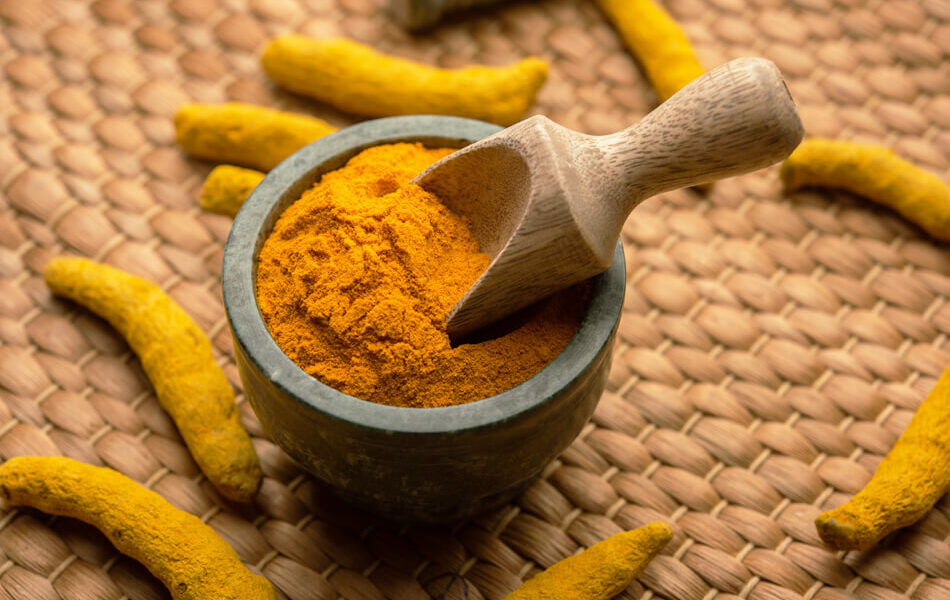Is Turmeric Good for Diabetes? Unpacking the Facts
We’re taking a look at some of the health benefits that turmeric can offer you if you’re living with diabetes, as well as some unexpected side effects that the tasty spice provides.

Living with diabetes can be extremely difficult. The condition forces you to pay close attention to every single food that you put in your body, and one wrong move can send you spiraling into an episode of imbalanced blood sugar and some nasty side effects.
However, there are some foods that are not only safe to eat when living with diabetes but could actually improve your condition. Turmeric is said to be one of those foods, and we’re here to find out whether that’s true or not.
Read on for the full scoop about how turmeric affects diabetes, insulin resistance, and diabetes management.
Is Turmeric Good for Diabetes?
The active ingredient in turmeric, curcumin, has been credited with a range of benefits that the spice is supposed to provide. Consuming turmeric root extract can help in reducing insulin resistance, which leads to a decrease in blood sugar levels. It can also improve beta cell functions, which are beneficial for diabetes.
It has been suggested that curcumin is able to decrease blood glucose levels in people with diabetes. Research suggests that curcumin might also have an important role to play in the prevention of diabetes, though more trials are needed to confirm this.
Turmeric extract is said to stabilize blood sugar levels and make diabetes more manageable. This extract can be found in over-the-counter supplements. It can regulate high blood sugar levels and reduce insulin resistance while offering a range of other health benefits, like improved digestion, lowering oxidative stress, and opening blood vessels.
Turmeric can have a positive effect on cardiovascular disease, acute coronary syndrome, autoimmune diabetes, and other immune system conditions, so add turmeric to your food regularly.
What Is Turmeric?
Turmeric, also called the golden spice or Indian saffron, is a tall plant that is grown in Central America and Asia. Turmeric powder found in your favorite grocery store is made of the ground roots of this plant, and the bright yellow color of processed turmeric has inspired cultures around the world to use it as a dye.
Turmeric’s main active ingredient is called curcumin, which has powerful biological properties. It has been used in traditional medicine for centuries to treat a range of health conditions like inflammation and chronic pain, and Western medicine has even begun to study the effects of turmeric for healing and pain relief.
While the spice is certainly tasty and nutritious for the body, it also has beneficial properties that can treat pain and inflammation. For instance, the Arthritis Foundation cites a number of studies in which turmeric has been found to reduce inflammation.
Studies have also supported turmeric as a pain relief agent in clinical trials, with one study noting that it seemed to work as well as ibuprofen in people with arthritis in their knees. The spice has even gained attention for its antioxidant abilities. In fact, this antioxidant effect seems to be so potent that it can stop your liver from being damaged by toxins released due to fatty liver disease.
This is great news for people who are taking strong medication for liver disorders, diabetes and diabetic vascular disease, and other health conditions that affect the liver.
How Quickly Does Turmeric Lower Blood Sugar?
Currently, there is not enough evidence to prove that turmeric is able to lower your blood sugar levels immediately. The effectiveness of curcumin lowering blood sugar is going to depend on your individual condition, though most people can expect some level of improvement within 4–8 weeks.
Beta cells are the pancreatic cells that produce insulin within your body. Diabetes occurs when these cells do not function properly. These cells can be repaired by curcumin extract obtained from turmeric roots.
Still, it’s important to remember that turmeric and curcumin are not meant to be used as replacements for insulin or any other prescribed diabetes medication.
If you have been diagnosed with diabetes or diabetic nephropathy, you should only use turmeric under the supervision of a medical professional as you are unable to monitor your beta cells and insulin resistance yourself.
How to Take Turmeric for Diabetes
You’ll find that a range of health sites suggest adding turmeric powder to your smoothies, using more in your foods, or drinking tea infused with the spice. The problem with these methods is that you are very unlikely to ingest the required curcumin levels to experience any benefits.
The most effective way to take turmeric to help diabetes management and diabetes-associated complications is via an encapsulated turmeric supplement.
Why is this? Turmeric powder only contains 3.14% curcumin on average. This means that there is only about 3.14mg of curcumin in 100mg of turmeric, which is next to nothing.
Another issue is that turmeric has poor absorption and bioavailability in the body without the aid of other substances. It has been proven that when you ingest turmeric with black pepper extract (also called piperine), you’ll absorb 20 times more curcumin.
So, if you want to maximize your turmeric intake for diabetes management, be sure to look for a product that contains both turmeric and piperine.
How to take turmeric daily
Turmeric is quite well-tolerated by most people. Some researchers have even provided study participants with as much as 8,000mg of curcumin a day with no treatment-related toxicity to report. Of course, this is an insanely high volume that we do not recommend you consume.
Lower curcumin doses have also been suggested to yield better cholesterol and blood sugar reduction than higher dosages. Furthermore, doses as high as 300mg of curcumin daily have shown substantial improvement in diabetes-related complications.
To manage diabetes and blood sugar, a dosage between 150mg and 250mg of curcumin daily is usually enough for most patients. When using turmeric supplements, you will want to start small and assess your blood sugar results over time. You should only increase your daily turmeric dosage when required.
6 Science-Backed Health Benefits of Turmeric
There is a range of benefits that turmeric provides, especially to those living with diabetes. Here are some of the most important:
#1 Improves skin health
Turmeric is not just a helpful ingredient because of its nutritional and health benefits. The spice contains antioxidant and anti-inflammatory properties that help your body protect itself from free radicals by neutralizing them. Free radicals are harmful to the skin and are known to worsen signs of aging.
One study has even suggested that the antioxidant effects in turmeric may also stimulate the activity of other antioxidants, providing your skin with even more anti-aging and protective benefits.
#2 Helps prevent arthritis
Thanks to its potent anti-inflammatory benefits, it is possible for curcumin to be used as an effective and safe long-term treatment for people struggling with osteoarthritis. It can even be used as a way to reduce your risk of contracting this illness.
A recent clinical trial studied the effects that curcumin supplementation had on people with osteoarthritis in the knees. The participants who took 40mg of nanocurcumin in a capsule every 12 hours experienced a substantial decrease in stiffness and pain after six weeks.
So, it is safe to say that curcumin, and by extension, turmeric, can help ease the symptoms of arthritis and even help prevent you from getting arthritis in the first place.
#3 Ensures better digestion
While turmeric is certainly a tasty spice to add to your cooking, it also plays an important role in digestion. Thanks to its anti-inflammatory antioxidant properties, the spice can contribute to healthier overall digestion.
In fact, Western medicine is currently exploring turmeric as a potential treatment option for people with irritable bowel syndrome. If you struggle with IBS, consider adding more turmeric to your diet.
#4 Fights inflammation
One of the main claims to fame of turmeric that we’ve already mentioned a few times is that it is commonly used to fight inflammation. In fact, curcumin can be a more effective anti-inflammatory agent than common inflammation-fighting medications if consumed in the right dosages.
Since chronic inflammation contributes to a range of chronic diseases, curcumin is able to treat conditions like pancreatitis, inflammatory bowel disease, and arthritis.
#5 Boosts detoxification
Turmeric is also known for its detoxification properties and can leave your body feeling soothed if you consume it once a day.
A simple daily turmeric detox recipe can be prepared by adding 1/3 tablespoon of turmeric, 1 tablespoon of lemon juice, and honey to taste to a glass of lukewarm water. Drinking it in the morning on an empty stomach works best.
#6 Helps manage diabetes
Curcumin has also been suggested to help treat and prevent diabetes by regulating insulin sensitivity and insulin resistance. Unfortunately, the studies that recorded these findings were only testing on animals.
However, curcumin may help fight diabetes through its antioxidant and anti-inflammatory properties and improve the many factors that contribute to the condition. This includes insulin resistance, hyperlipidemia, and high blood sugar.
What Are the Side Effects of Turmeric?
Perhaps the most uncomfortable side effect that turmeric causes is that it can upset your stomach. This is because the same agents that support digestive health can also cause irritation when consumed in large volumes. Turmeric stimulates gastric acid production in the stomach, which may help digestion for some, and cause an upset stomach for others.
While turmeric may also lower blood sugar levels, which is useful when treating diabetes, it is also known to thin the blood. This causes you to bleed more easily, and while it is not clear why this happens, it is likely due to the fact that turmeric lowers cholesterol levels and blood pressure.
If you are already taking blood-thinning medications, you should avoid consuming large doses of turmeric.
Who Should Not Use Turmeric?
We’ve gone on about the various benefits of adding more turmeric to your diet, especially for diabetes patients, but there are certain conditions that are not compatible with increased doses of turmeric.
These include:
- Bleeding disorders
- Gallbladder disease
- Gastroesophageal reflux
- Infertility
- Liver disease
- Iron deficiency
- Heart arrhythmia
- Hormone-sensitive conditions
People who are pregnant or those who are preparing to undergo a surgical procedure should also avoid turmeric.
A Word From Our Nutritionist
If you’re living with diabetes, you know that it can make your life a waking nightmare. It completely messes with your diet, forces you to be extremely conscious about the foods you consume, and has a nasty list of symptoms that can make day-to-day living feel like an impossible challenge.
Luckily, there exist some simple ways for you to manage your condition and take control of your life again, and one of those methods involves consuming more turmeric.
Part of the ginger family, this vibrant root has a range of potential health benefits that make it nothing short of a superfood. It can be a great ingredient to add to your diet for managing diabetes, thanks to its ability to reduce high blood pressure and blood sugar.
So, if you want a simple way to help improve your condition, even just slightly, add turmeric to your foods.
Conclusion
Turmeric supplements can be a useful way to fight diabetic complications and also promote diabetes prevention. It boasts anti-inflammatory properties that are able to reduce pain caused by diabetic edema and is also able to lower blood sugar levels in diabetes patients.
Additionally, turmeric does not increase blood glucose levels and thus will not negatively impact your blood sugar. It is an easy ingredient to incorporate into your diet and can even be taken in supplement form for added convenience and increased absorption.

















































 Select your language:
Select your language: 








